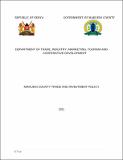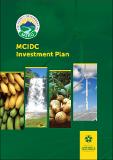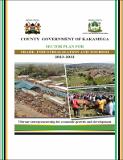| dc.date.accessioned | 2020-11-24T12:20:22Z | |
| dc.date.available | 2020-11-24T12:20:22Z | |
| dc.date.issued | 2017 | |
| dc.identifier.uri | http://repository.kippra.or.ke/handle/123456789/2218 | |
| dc.description.abstract | This study examines the effects of trade facilitation on foreign direct investments in Kenya. Open, predictable and transparent trade and investment regimes have become necessary due to growing fragmentation of production across borders. Kenya has so far been a poor performer of FDI despite being the strongest and most diversified economy in East Africa. Yet, the government has undertaken major reforms aimed at improving the business environment and attracting new investments since independence. So far, there are limited studies on how underlying transaction costs in domestic and international transactions might affect FDI decisions in Kenya. The study uses a fixed effects Poisson Pseudo Maximum-Likelihood gravity model in the analysis. Bilateral FDI data for the period 2001-2012 and various trade facilitation indicators were used. The results indicate that improvements of indicators related to domestic transaction costs, specifically enforcement of contracts, have significant effects on FDI flows in Kenya. The country should therefore enhance the efficiency of the judicial system in resolving commercial disputes as a way to increase foreign direct investments | en |
| dc.language.iso | en | en |
| dc.publisher | The Kenya Institute for Public Policy Research and Analysis (KIPPRA) | en |
| dc.relation.ispartofseries | DP/189/2017; | |
| dc.subject | Trade Facilitation | en |
| dc.subject | Foreign Direct Investment | en |
| dc.subject | Investment Regimes | en |
| dc.subject | Bilateral Trade | en |
| dc.title | Discussion Paper No. 189 of 2017 on Implications of Trade Facilitation on Foreign Direct Investments in Kenya | en |
| dc.type | KIPPRA Publications | en |
| ppr.contributor.author | Onyango, Christopher Hugh | |




